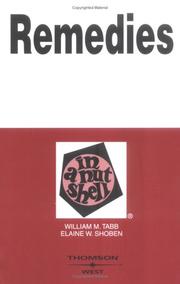| Listing 1 - 10 of 374 | << page >> |
Sort by
|
Book
ISBN: 0198814402 9780198814405 Year: 2020 Publisher: Oxford ; New York, NY : Oxford University Press,
Abstract | Keywords | Export | Availability | Bookmark
 Loading...
Loading...Choose an application
- Reference Manager
- EndNote
- RefWorks (Direct export to RefWorks)
The law enables private parties to undo the wrongs committed against them, allowing victims to seek redress. A distinctive kind of justice governs our legal rights of redress, different from the leading corrective justice approaches. Through analysis of this key idea, The Right of Redress helps to make sense of tort, contract, fiduciary law, and unjust enrichment doctrine. When a wrong is remedied, the authorship of that remedy matters. The justice in private law is sensitive to a right holder's authorship, and understanding how solves a number of legal theory puzzles. Many forms of redress are only available with state assistance, and a full account of private law requires an account of the state's responsibility to assist. It also requires an explanation of those cases in which the state declines to assist. Prior accounts have drawn on Kantian principles or a Lockean social contract theory, where The Right of Redress, drawing on public fiduciary theory, develops a distinctive account of the state's role. This book offers a new take on various modern features of the private law landscape, ranging from equity, to damage caps, to arbitration, to corporate claims, to class actions. The Right of Redress thus offers a pathbreaking account of the justice in private law, the political theory that underlies it, and the contemporary features that shape our rights of redress today.
Book
ISBN: 0199229775 9780199229772 Year: 2019 Publisher: Oxford, United Kingdom : Oxford University Press,
Abstract | Keywords | Export | Availability | Bookmark
 Loading...
Loading...Choose an application
- Reference Manager
- EndNote
- RefWorks (Direct export to RefWorks)
"Rights, Wrongs, and Injustices is the first comprehensive account of remedial law's scope, foundations, and structure. A remedy, it argues, is a judicial ruling, and remedial law is the body of rules governing the availability and content of remedies. Focussing on rulings that are intended to resolve private law disputes (for example, awards of damages, injunctions, and restitutionary orders), this book explains why remedial law is distinctive, how it relates to substantive law, and what its foundational principles are. Drawing on doctrinal, historical, and philosophical sources, it advances four main arguments. First, the question of what courts should do when individuals seek their assistance (the focus of remedial law) is different from the question of how individuals should treat one another in their day-to-day lives (the focus of substantive law). Second, remedies provide distinctive reasons to perform the actions they command; in particular, they provide reasons different from those provided by either rules or sanctions. Third, remedial law has a complex relationship to substantive law. Some remedies are responses to rights-threats, others to wrongs, and yet others to injustices. Further, remedies respond to these events in different ways: while some remedies replicate substantive duties, others modify duties or create entirely new duties. Finally, remedial law is underpinned by general principles-principles that cut across the traditional distinctions between so-called 'legal' and 'equitable' remedies. Together, these arguments provide the foundation for an understanding of remedial law that takes the concept of a remedy seriously, classifies remedies according to their grounds and content, illuminates the relationship between remedies and substantive rights, and explains remedial law in terms of general principles, not historical categories"--

ISBN: 031485066X Year: 1985 Publisher: Saint Paul West publishing co.
Abstract | Keywords | Export | Availability | Bookmark
 Loading...
Loading...Choose an application
- Reference Manager
- EndNote
- RefWorks (Direct export to RefWorks)
Book
ISBN: 9789089743749 Year: 2011 Publisher: Den Haag Boom juridische uitgevers
Abstract | Keywords | Export | Availability | Bookmark
 Loading...
Loading...Choose an application
- Reference Manager
- EndNote
- RefWorks (Direct export to RefWorks)

ISBN: 0314146040 Year: 2005 Publisher: Saint Paul Thomson West
Abstract | Keywords | Export | Availability | Bookmark
 Loading...
Loading...Choose an application
- Reference Manager
- EndNote
- RefWorks (Direct export to RefWorks)
Book
ISBN: 9780314267023 Year: 2013 Publisher: Saint Paul Thomson West
Abstract | Keywords | Export | Availability | Bookmark
 Loading...
Loading...Choose an application
- Reference Manager
- EndNote
- RefWorks (Direct export to RefWorks)
Book
ISBN: 9780314911568 Year: 2011 Publisher: Saint Paul West
Abstract | Keywords | Export | Availability | Bookmark
 Loading...
Loading...Choose an application
- Reference Manager
- EndNote
- RefWorks (Direct export to RefWorks)
Book
ISBN: 9780314267597 031426759X Year: 2018 Publisher: St. Paul, MN West Academic Publishing
Abstract | Keywords | Export | Availability | Bookmark
 Loading...
Loading...Choose an application
- Reference Manager
- EndNote
- RefWorks (Direct export to RefWorks)
Book
ISBN: 1472560299 1281948403 9786611948405 184731435X Year: 2008 Publisher: Oxford Portland, Oregon Hart Publishing
Abstract | Keywords | Export | Availability | Bookmark
 Loading...
Loading...Choose an application
- Reference Manager
- EndNote
- RefWorks (Direct export to RefWorks)
In August 2006 the third Australian Obligations Conference was hosted in Brisbane by the TC Beirne School of Law. The theme of the Conference was "Justifying Private Law Remedies". This book contains a number of the papers delivered at that Conference, presented under several categories but all dealing with the fundamental issue of justification: General Concepts; Performance; Compensation; Punishment; and Restitution and Disgorgement. The authors are largely drawn from the legal academy, and include Canadian, Australian, British and New Zealand scholars. The collection will be of interest to all those concerned with the role, nature and place of remedies in the private law of the common law world

ISBN: 9780199278756 019927875X Year: 2005 Publisher: Oxford: Oxford university press,
Abstract | Keywords | Export | Availability | Bookmark
 Loading...
Loading...Choose an application
- Reference Manager
- EndNote
- RefWorks (Direct export to RefWorks)
Remedies (Law). --- Remedies (Law) --- Law
| Listing 1 - 10 of 374 | << page >> |
Sort by
|

 Search
Search Feedback
Feedback About UniCat
About UniCat  Help
Help News
News